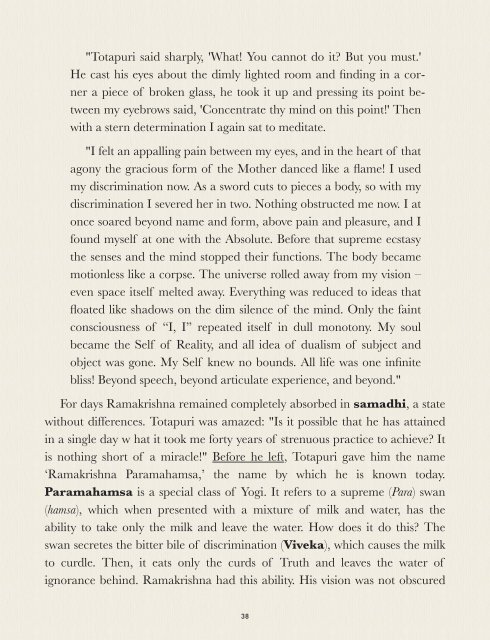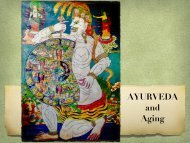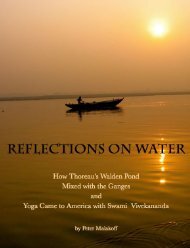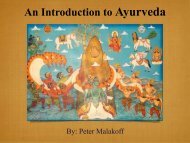How Thoreau's Walden Pond Mixed with the Ganges and Yoga Came to America with Swami Vivekananda
One early morning in 1846, during the coldest days of a New England winter, Henry David Thoreau looked out the window of his small cabin on Walden Pond and saw men cutting its ice into blocks. That ice was hauled by horse to a railroad that ran across the western edge of Walden Pond, packed into a boxcar, taken to Boston and loaded onto a clipper ship that sailed to Calcutta, India, arriving about four months later. Once there, that ice was purchased by grateful members of the East India Company. Thoreau had witnessed a small part of the global ice trade between New England and India that took place during the latter part of the nineteenth century. When Thoreau considered the ice trade, his vision sailed on metaphors far beyond the scope of business. The waters he imagined flowed both east and west and carried not just natural elements, but culture, religion and philosophy as well. He envisioned that after arriving in Calcutta, the New England ice of Walden Pond would eventually melt and run downhill where it would join with the sacred water of the Ganges. He wrote in Walden: "It appears that the sweltering inhabitants of Charleston and New Orleans, of Madras and Bombay and , drink at my well. In the morning I bathe my intellect in the stupendous and cosmogonal philosophy of the , since whose composition years of the gods have elapsed, and in comparison with which our modern world and its literature seem puny and trivial; and I doubt if that philosophy is not to be referred to a previous state of existence, so remote is its sublimity from our conceptions. I lay down the book [Bhagavad-Gita] and go to my well for water, and lo! there I meet the servant of the Bramin, priest of and and who still sits in his temple on the Ganges reading the , or dwells at the root of a tree with his crust and water jug. I meet his servant come to draw water for his master, and our buckets as it were grate together in the same well. The pure Walden water is mingled with the sacred water of the Ganges." This book tells the story of these waters . . .
One early morning in 1846, during the coldest days of a New England winter, Henry David Thoreau looked out the window of his small cabin on Walden Pond and saw men cutting its ice into blocks. That ice was hauled by horse to a railroad that ran across the western edge of Walden Pond, packed into a boxcar, taken to Boston and loaded onto a clipper ship that sailed to Calcutta, India, arriving about four months later. Once there, that ice was purchased by grateful members of the East India Company. Thoreau had witnessed a small part of the global ice trade between New England and India that took place during the latter part of the nineteenth century.
When Thoreau considered the ice trade, his vision sailed on metaphors far beyond the scope of business. The waters he imagined flowed both east and west and carried not just natural elements, but culture, religion and philosophy as well. He envisioned that after arriving in Calcutta, the New England ice of Walden Pond would eventually melt and run downhill where it would join with the sacred water of the Ganges. He wrote in Walden: "It appears that the sweltering inhabitants of Charleston and New Orleans, of Madras and Bombay and , drink at my well. In the morning I bathe my intellect in the stupendous and cosmogonal philosophy of the , since whose composition years of the gods have elapsed, and in comparison with which our modern world and its literature seem puny and trivial; and I doubt if that philosophy is not to be referred to a previous state of existence, so remote is its sublimity from our conceptions.
I lay down the book [Bhagavad-Gita] and go to my well for water, and lo! there I meet the servant of the Bramin, priest of and and who still sits in his temple on the Ganges reading the , or dwells at the root of a tree with his crust and water jug. I meet his servant come to draw water for his master, and our buckets as it were grate together in the same well. The pure Walden water is mingled with the sacred water of the Ganges."
This book tells the story of these waters . . .
You also want an ePaper? Increase the reach of your titles
YUMPU automatically turns print PDFs into web optimized ePapers that Google loves.
"Totapuri said sharply, 'What! You cannot do it? But you must.'<br />
He cast his eyes about <strong>the</strong> dimly lighted room <strong>and</strong> finding in a corner<br />
a piece of broken glass, he <strong>to</strong>ok it up <strong>and</strong> pressing its point between<br />
my eyebrows said, 'Concentrate thy mind on this point!' Then<br />
<strong>with</strong> a stern determination I again sat <strong>to</strong> meditate.<br />
"I felt an appalling pain between my eyes, <strong>and</strong> in <strong>the</strong> heart of that<br />
agony <strong>the</strong> gracious form of <strong>the</strong> Mo<strong>the</strong>r danced like a flame! I used<br />
my discrimination now. As a sword cuts <strong>to</strong> pieces a body, so <strong>with</strong> my<br />
discrimination I severed her in two. Nothing obstructed me now. I at<br />
once soared beyond name <strong>and</strong> form, above pain <strong>and</strong> pleasure, <strong>and</strong> I<br />
found myself at one <strong>with</strong> <strong>the</strong> Absolute. Before that supreme ecstasy<br />
<strong>the</strong> senses <strong>and</strong> <strong>the</strong> mind s<strong>to</strong>pped <strong>the</strong>ir functions. The body became<br />
motionless like a corpse. The universe rolled away from my vision –<br />
even space itself melted away. Everything was reduced <strong>to</strong> ideas that<br />
floated like shadows on <strong>the</strong> dim silence of <strong>the</strong> mind. Only <strong>the</strong> faint<br />
consciousness of “I, I” repeated itself in dull mono<strong>to</strong>ny. My soul<br />
became <strong>the</strong> Self of Reality, <strong>and</strong> all idea of dualism of subject <strong>and</strong><br />
object was gone. My Self knew no bounds. All life was one infinite<br />
bliss! Beyond speech, beyond articulate experience, <strong>and</strong> beyond."<br />
For days Ramakrishna remained completely absorbed in samadhi, a state<br />
<strong>with</strong>out differences. Totapuri was amazed: "Is it possible that he has attained<br />
in a single day w hat it <strong>to</strong>ok me forty years of strenuous practice <strong>to</strong> achieve? It<br />
is nothing short of a miracle!" Before he left, Totapuri gave him <strong>the</strong> name<br />
‘Ramakrishna Paramahamsa,’ <strong>the</strong> name by which he is known <strong>to</strong>day.<br />
Paramahamsa is a special class of Yogi. It refers <strong>to</strong> a supreme (Para) swan<br />
(hamsa), which when presented <strong>with</strong> a mixture of milk <strong>and</strong> water, has <strong>the</strong><br />
ability <strong>to</strong> take only <strong>the</strong> milk <strong>and</strong> leave <strong>the</strong> water. <strong>How</strong> does it do this? The<br />
swan secretes <strong>the</strong> bitter bile of discrimination (Viveka), which causes <strong>the</strong> milk<br />
<strong>to</strong> curdle. Then, it eats only <strong>the</strong> curds of Truth <strong>and</strong> leaves <strong>the</strong> water of<br />
ignorance behind. Ramakrishna had this ability. His vision was not obscured<br />
38


















